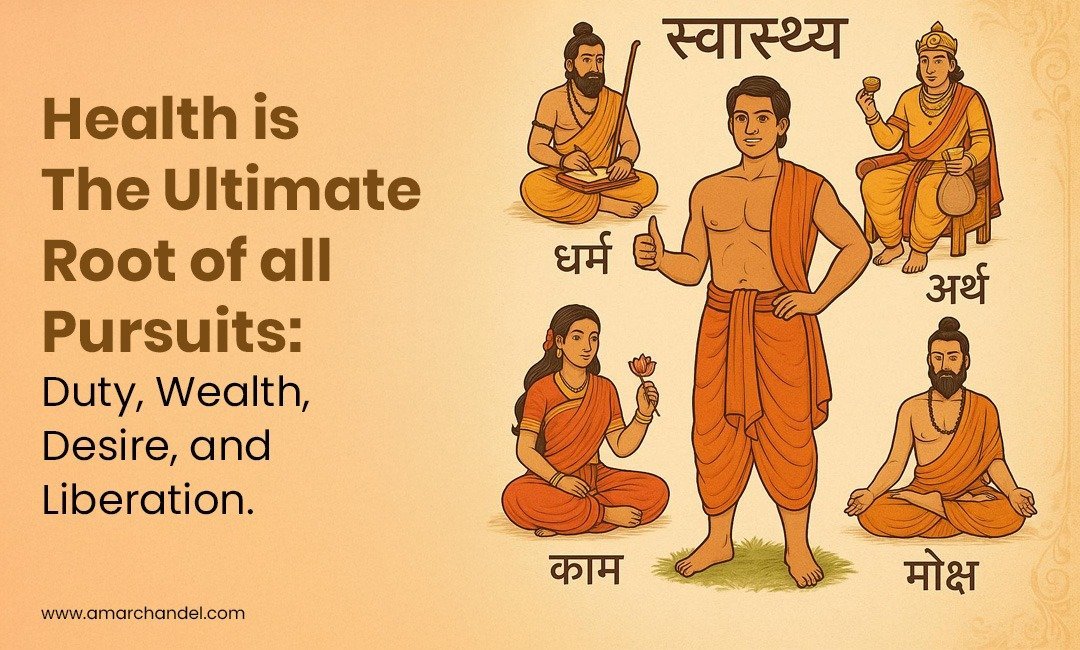“Dharma, artha, kāma, mokṣāṇām ārogyam mūlam uttamam”
(Health is the ultimate root of all pursuits: duty, wealth, desire, and liberation.)
Source: Charaka Samhita
This profound verse from the Charaka Samhita, a foundational Ayurvedic text, emphasises that good health (ārogya) is the essential foundation for achieving the four primary goals of human life, known as the Purusharthas:
1. Dharma (Duty/Righteousness): Upholding moral values and fulfilling one’s responsibilities.
2. Artha (Wealth/Prosperity): Acquiring material resources necessary for a comfortable life.
3. Kāma (Desire/Pleasure): Fulfilling desires and seeking emotional and sensory pleasures.
4. Mokṣa (Liberation): Attaining spiritual enlightenment and liberation from the cycle of birth and death.

Understanding the Purusharthas
Dharma
• Definition: Represents one’s duty, ethics, and moral obligations. It guides individuals to live righteously and in harmony with societal and cosmic laws.
• Significance: Fulfilling one’s dharma ensures societal order and personal satisfaction. It encompasses duties towards family, society, and oneself.
Artha
• Definition: Pertains to the pursuit of wealth and material prosperity.
• Significance: Material resources are essential for sustaining life, supporting family, and contributing to society. Proper acquisition and management of wealth enable individuals to perform their duties effectively and enjoy life’s pleasures.
Kāma
• Definition: Relates to the pursuit of desires, pleasures, and emotional fulfilment.
• Significance: Seeking joy and satisfaction through relationships, art, music, and other sensory experiences contributes to a balanced and contented life.
Mokṣa
• Definition: The pursuit of spiritual liberation and self-realisation.
• Significance: Represents the ultimate goal of human existence, freeing oneself from the cycle of birth and death and uniting with the universal consciousness.
The Central Role of Health (Ārogya)
The verse underscores that ārogya (health) is the mūlam uttamam (supreme foundation) for achieving these four goals. Without good health:
• Dharma: One may struggle to fulfil personal and societal duties due to physical or mental limitations.
• Artha: The ability to work, earn, and manage resources can be compromised.
• Kāma: Enjoyment of life’s pleasures becomes difficult when plagued by illness.
• Mokṣa: Physical and mental well-being are crucial for spiritual practices like meditation and self-reflection.
Thus, maintaining good health is paramount for a fulfilling and purposeful life.
Relevance in the Present-Day Context
In today’s fast-paced world, the significance of this ancient wisdom is more pertinent than ever:
• Lifestyle Diseases: Modern sedentary lifestyles and unhealthy eating habits have led to a surge in diseases like diabetes, hypertension, and obesity. Prioritising health through balanced diets and regular exercise is essential.
• Mental Health Challenges: The prevalence of stress, anxiety, and depression underscores the need for holistic health approaches that address both body and mind.
• Work-Life Balance: Achieving professional success (artha) and personal satisfaction (kāma) requires robust health to manage responsibilities effectively.
• Spiritual Pursuits: Practices aimed at liberation (mokṣa), such as meditation and yoga, are more effective when one is in good health.
Embracing the principle that health is the foundation of all life pursuits encourages individuals to adopt lifestyles that promote physical, mental, and spiritual well-being.
That is why I lay so much stress on:
• A Balanced Diet: Consumption of fresh, natural foods to nourish the body.
• Regular Physical Activity: Incorporating yoga and other forms of exercise to maintain bodily harmony.
• Mental Well-being: Promoting meditation and mindfulness to achieve mental clarity and peace.
• Spiritual Growth: Guiding individuals towards self-realisation and liberation.
Following the Holistic principles will help you in attaining all four Purusharthas. By prioritising physical and mental well-being, you will be better equipped to achieve your duties, acquire wealth, enjoy life’s pleasures, and pursue spiritual liberation. In the modern era, where health challenges are prevalent, returning to these ancient teachings offers a pathway to holistic wellness and a harmonious existence.


Give a Reply